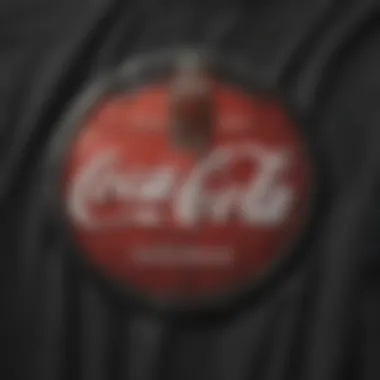Coca-Cola T-Shirts: Cultural Impact and Trends


Intro
Coca-Cola T-shirts represent much more than a mere piece of clothing. They signify a connection with a brand that has transcended generations, landscapes, and cultures. The significance of these T-shirts lies in their ability to bridge historical context, cultural identity, and consumer consumerism. As we delve into the facets surrounding Coca-Cola T-shirts, we will explore their journey from a simple promotional item to a global fashion statement.
Understanding the cultural resonance of Coca-Cola T-shirts requires us to acknowledge their historical roots. These garments have been worn not just as fashion but as symbols of joy and community. This article will analyze how Coca-Cola’s branding intertwines with fashion trends, particularly in the extreme sports arena where the vigor and thrill of athleticism meet the classic image of Coca-Cola.
The evolution of Coca-Cola T-shirts is marked by shifts in design and the need for practicality, giving rise to variations that cater to different consumer behaviors. Through this discussion, we will examine how these garments have become a medium of self-expression for individuals, allowing them to showcase their interests, affiliations, and lifestyle choices. Additionally, environmental concerns surrounding production will be addressed to paint a clear picture of the future of branded fashion.
This exploration will serve not just enthusiasts of Coca-Cola but also casual observers, contextualizing how these T-shirts encapsulate a global phenomenon. The discussions will reveal a tapestry of branding, cultural significance, and practical aspects, providing a thorough understanding of where Coca-Cola T-shirts sit in today's fashion landscape.
Prologue to Coca-Cola T-Shirts
Coca-Cola T-shirts have come to symbolize not only a popular beverage but also a cultural artifact deeply embedded in consumer identity. The exploration of this topic reveals how the T-shirts serve as more than merely clothing. They encapsulate marketing strategies, trends in fashion, and reflections of societal values. Understanding Coca-Cola T-shirts aids in appreciating their role in shaping consumer behaviors and preferences.
Overview of Coca-Cola as a Brand
Coca-Cola, founded in the late 19th century, is an iconic brand with global reach. Its image is synonymous with refreshment and happiness. The logo's distinct red and white colors evoke feelings of nostalgia and familiarity. The brand has mastered the art of branding, continually evolving its strategy to maintain relevance in a rapidly changing market. The merchandise, especially T-shirts, is a testament to this marketing genius. These shirts encapsulate brand messages and lifestyle aspirations. They are not only wearable items but also statements of belonging to a community that celebrates shared experiences.
Evolution of Branding in Apparel
The journey of branding in apparel has been significant. Initially, clothing served a purely functional purpose. Over time, brands like Coca-Cola recognized the potential of apparel as a medium for expressing identity. T-shirts became a canvas for companies to display logos, slogans, and images. As fashion shifted, T-shirts transitioned from basic items to high-value collectibles. In today's market, branding strategies focus on emotional connection and cultural relevance.
- Iconic Design: Coca-Cola has employed various designs over the decades, tapping into different cultures and trends.
- Merchandising: The brand has mastered merchandising, ensuring its symbols remain prominent in merchandise.
- Fashion Collaboration: Collaborations with designers and influencers have further elevated Coca-Cola T-shirts in fashion circles.
These elements combined show that Coca-Cola T-shirts are not just apparel but are also a tool for building and sustaining brand loyalty.
Historical Context
Understanding the historical context of Coca-Cola T-shirts is crucial, as it unveils the timeline and evolution of the brand's merchandise strategy. These shirts are not merely fashion items; they serve as cultural artifacts that reflect changing societal values, marketing tactics, and consumer behaviour. By examining the rise of Coca-Cola merchandise, we can appreciate how the brand has shaped and been shaped by its audience over the decades.
The Rise of Coca-Cola Merchandise
Coca-Cola began producing merchandise shortly after its inception in 1886. Initially, the brand focused on promoting its beverages through various marketing strategies, including giveaways and promotional items. As the company expanded globally in the early 20th century, it recognized the potential of apparel, particularly T-shirts, as a way to enhance its visibility and brand identity.
In the 1980s, Coca-Cola capitalized on the growing trend of casual wear. T-shirts became vital tools for promotion, often featuring catchy slogans and the iconic logo. This was the era when Coca-Cola merchandise transcended beyond mere branding; it became a fashion statement. Moreover, T-shirts began to proliferate in music videos and television, cementing their status in pop culture.
Coca-Cola T-Shirts Through the Decades
Coca-Cola T-shirts have undergone significant transformations to cater to the evolving tastes of each decade.
- 1950s: Simple designs, often with the logo prominently displayed. The focus was on brand identification rather than aesthetics.
- 1960s-1970s: Introduction of bold graphics and vibrant colors. T-shirts became synonymous with youth counterculture movements, linking the brand to themes of freedom and choice.
- 1980s-1990s: This period saw an explosion of creativity and variety. Collaborations with famous designers and artists resulted in limited edition pieces that appealed to collectors.
- 2000s: The digital era influenced designs, with the rise of e-commerce. Merchandise became accessible globally, and digital graphics allowed for more intricate designs.
- 2010s-Present: A shift towards sustainability. Increasingly, Coca-Cola has incorporated eco-friendly materials and practices in their T-shirt production.
As Coca-Cola T-shirts evolved, they began to symbolize more than just a beverage brand. They became a canvas for expressing personal identity, social values, and cultural affiliation. This journey through the decades not only highlights the importance of Coca-Cola in fashion but also tracks the changing landscape of consumer desires.
"Coca-Cola T-shirts transcend mere clothing; they encapsulate a blend of history, identity, and culture that resonates across generations."
This historical context provides valuable insights into how Coca-Cola has shaped its merchandise strategy, and how such strategies have, in turn, impacted consumer culture.
Cultural Resonance


The cultural resonance of Coca-Cola T-shirts is significant within the realms of identity, fashion, and lifestyle. As this article explores the intersection of branding and consumer behavior, these shirts emerge not just as items of clothing but as key symbols of cultural narratives and shared experiences. T-shirts bearing the Coca-Cola logo convey notions of belonging, nostalgia, and even rebellion. They represent a convergence of personal expression and societal values, elevating them beyond mere commercial products.
Coca-Cola T-Shirts in Popular Culture
Coca-Cola T-shirts have permeated popular culture in a myriad of ways. Public figures often sport these shirts, contributing to their status as fashion staples. Movie scenes, music videos, and social media are dotted with individuals wearing iconic Coca-Cola apparel, which reinforces the brand's connection to leisure, happiness, and community.
Prominent advertising campaigns that feature Coca-Cola T-shirts serve to further embed the brand in the cultural fabric. For example, campaigns around summer themes or holidays frequently highlight T-shirts, blending lifestyle marketing with cultural moments. This results in a recognition that extends beyond brand loyalty and enters the realm of lifestyle affiliation.
"Coca-Cola T-shirts act as canvases for cultural expression, allowing individuals to showcase not just a brand but a lifestyle that aligns with personal aspirations and collective ideals."
In addition to being embraced by the public, these T-shirts also find their way into art and design, where they are reimagined or repurposed into unique statement pieces. Designers draw inspiration from the classic Coca-Cola aesthetic, mixing vintage designs with modern trends. This creative integration demonstrates how such apparel transcends its original purpose, becoming part of broader cultural conversations.
Associations with Extreme Sports
Coca-Cola T-shirts are recognized within extreme sports, forming associations to thrill and adventurous lifestyles. The visual identity of Coca-Cola resonates with the adrenaline-fueled spirit of extreme sports, like skateboarding, snowboarding, and BMX biking. Wearing a Coca-Cola T-shirt in these settings signals not just brand affiliation but also a claim to a specific identity.
Collaborations with professional athletes have bolstered this connection. Athletes often appear in promotional materials or events wearing Coca-Cola apparel, solidifying its presence in extreme sports culture. This affiliation attracts a specific demographic that seeks out brands which represent both performance and lifestyle.
Moreover, extreme sports events often feature merchandise stalls showcasing Coca-Cola T-shirts, drawing fans and enthusiasts closer to the brand. The synergy between Coca-Cola and extreme sports enhances the brand's appeal to a younger audience keen on adventure and self-expression. This partnership nurtures a community where the values of courage, individuality, and excitement align seamlessly with Coca-Cola's overarching brand message.
The Aesthetic Appeal of Coca-Cola T-Shirts
The aesthetic appeal of Coca-Cola T-shirts plays a significant role in their popularity and cultural impact. These shirts serve not only as clothing articles but as expressions of identity and lifestyle. The visual design, color schemes, and graphics used have evolved over time, tapping into the nostalgia associated with the Coca-Cola brand. Additionally, the aesthetic choices resonate with consumers who either seek a casual look or a stylish statement piece, making them versatile for different occasions.
Design Trends Over the Years
The design of Coca-Cola T-shirts has consistently mirrored broader trends in fashion. From the retro logos of the 1970s to modern minimalist styles, each era brings a fresh perspective on how to represent the brand.
- Bold Logos: Early Coca-Cola T-shirts often featured large, bold logos prominently displayed on the front. This style emphasized brand identity and ensured visibility.
- Graphic Illustrations: In the 1990s, graphic interpretations of Coke's brand elements emerged, showcasing the drink in artistic forms, often integrating pop art influences.
- Sustainable Designs: Recent trends have seen designers focusing on sustainable fashion, where the aesthetic appeal is paired with eco-friendly materials and practices. The designs also reflect a growing consciousness towards environmental issues, which align with consumer values today.
Material Choices and Sustainability
Material choices for Coca-Cola T-shirts are crucial to their appeal and marketability. Consumers are increasingly aware of the fabric's impact on the environment. Common materials used in Coca-Cola apparel include cotton, polyester, and blends, each with unique properties.
- Cotton: Soft and breathable, cotton is a popular choice for comfort and wearability.
- Polyester: Often used for its durability and ability to wick moisture away, making it ideal for sports enthusiasts.
- Sustainable Fabrics: Brands are now experimenting with organic cotton or recycled materials to meet the demand for sustainable fashion.
Coca-Cola's commitment to sustainable sourcing of materials not only enhances the aesthetic of their T-shirts but also aligns with consumers' growing desire for ethical consumption. This shift in material choice signifies a changing landscape where aesthetics and ethical considerations coexist in the fashion industry.
"The evolution of design trends in Coca-Cola T-shirts illustrates a successful blend of brand recognition and contemporary values, bridging the old with the new."
In summary, the aesthetic appeal of Coca-Cola T-shirts is influenced by design trends and material choices, creating a product that resonates with various consumer demographics. The fusion of style with ethical considerations ensures that these T-shirts not only look good but also feel good to wear.
Market Dynamics
Understanding the market dynamics surrounding Coca-Cola T-shirts is essential for comprehending their broader cultural implications. This section examines several key elements that define the market behavior of Coca-Cola apparel today. An exploration of this topic reveals the intersection of consumer preferences, retail strategies, and the influence of modern technology as pivotal factors driving both authenticity and brand loyalty.
Consumer Demographics for Coca-Cola Apparel
Coca-Cola has established a diversified consumer base across various demographics. Unlike niche sports brands, Coca-Cola T-shirts appeal to a wide range of individuals, from emotional buyers who connected to nostalgic advertising to the younger generation looking for fashionable leisurewear. The brand's global appeal stems from its ability to resonate with multiple cultures and lifestyle segments.


Key consumer groups include:
- Youth: Predominantly teenagers and young adults, who find the T-shirts fashionable and a representation of a lifestyle marked by spontaneity and fun.
- Collectors: Some consumers actively collect Coca-Cola merchandise, driven by nostalgia or brand loyalty.
- Extreme Sports Enthusiasts: A significant portion of consumers actively engages in extreme sports, incorporating Coca-Cola apparel as part of their identity.
This wide demographic ensure Coca-Cola maintains relevance, adjusting strategies in marketing campaigns that resonate with both younger audiences and loyal customers.
E-commerce and Retail Strategies
With the rise of digital shopping, Coca-Cola has adapted its retail strategies to stay competitive. E-commerce plays a vital role in reaching modern consumers who prefer shopping online for convenience. Effective digital marketing strategies include targeted advertisements and collaborations with popular social media influences, expanding brand reach among diverse audiences.
Key strategies include:
- Omni-channel marketing: Combining online sales with brick-and-mortar stores ensures consumers can find Coca-Cola products in whatever format they prefer.
- Social media engagement: Platforms such as Facebook and Instagram leverage user-generated content to create a community of Coca-Cola enthusiasts.
- Seasonal promotions: Special edition Coca-Cola T-shirts linked to events or festivities align with consumer interests and trends, boosting sales during peak shopping times.
The Role of Coca-Cola T-Shirts in Extreme Sports
Coca-Cola T-shirts have carved out a notable space in extreme sports culture. They are not just clothing. They symbolize a lifestyle, a community, and a shared passion for thrill-seeking pursuits. This section examines the importance of Coca-Cola T-shirts within this dynamic realm, highlighting how the brand resonates with adrenaline enthusiasts and athletes alike.
Branding in the Extreme Sports Community
In the world of extreme sports, branding plays a critical role. Coca-Cola's incorporation into this arena provides a dual benefit: for the brand, it enhances visibility in a niche market; for athletes and fans, it cultivates a sense of identity and belonging.
Coca-Cola represents more than just a beverage. It stands for refreshment, enjoyment, and the shared experiences that come with high-energy activities. The sleek designs of Coca-Cola T-shirts often feature iconic logos and vibrant colors, making them appealing not only for wearing during events but also for casual outings. The connection between Coca-Cola and extreme sports offers a powerful platform for marketing which attracts not just fans of the brand but also those who live for the thrill.
Key Elements:
- Visibility: Exposure at extreme sports events aids brand recognition.
- Community: Fans and athletes often feel a strong connection to brands representing shared values.
- Identity: Coca-Cola T-shirts foster a sense of identity among extreme sports enthusiasts.
Collaborations with Athletes and Events
Coca-Cola’s partnerships with athletes and sports events further amplify its presence in extreme sports. Collaborating with well-known athletes who resonate with the extreme sports ethos enhances the brand's appeal. These partnerships often yield exclusive merchandise that combines Coca-Cola branding with the identity of the athlete, creating limited-edition T-shirts that attract consumers.
Events like skateboarding competitions, extreme skiing, and BMX biking tournaments often showcase Coca-Cola branding prominently. Sponsoring these events allows Coca-Cola to reach a specific audience more effectively. Event attendees frequently purchase branded apparel featuring Coca-Cola logos, turning spectator wear into a trendy statement.
Considerations:
- Market Targeting: Focusing on the extreme sports demographics allows for strategic outreach.
- Exclusive Merchandise: Limited-edition T-shirts generated through collaborations create a desire among collectors.
- Long-Term Relationships: Ongoing partnerships with athletes secure brand loyalty and visibility over time.
"Coca-Cola T-shirts serve as a canvas, showcasing both a brand and a lifestyle that embodies the spirit of adventure."
The integration of Coca-Cola T-shirts into extreme sports reflects a sophisticated branding strategy that enhances both the consumer experience and the brand’s image. As sports continue to evolve, Coca-Cola’s role not only as a beverage but as a lifestyle brand will likely grow, keeping pace with consumers’ interests in performance, identity, and community.
Ethical and Environmental Considerations
The discussion around ethical and environmental considerations in fashion is increasingly relevant. This section examines how Coca-Cola T-shirts embody these aspects, impacting consumer perception and corporate responsibility. As apparel becomes a vehicle for personal expression, its production methods draw scrutiny. The implications of sustainable practices in sourcing materials and corporate environmental initiatives become significant for consumers who prioritize eco-conscious choices.
Sustainable Sourcing of Materials
Sustainable sourcing is a critical element for Coca-Cola T-shirts. The choice of fabrics directly influences environmental impact. Organic cotton, recycled polyester, and other eco-friendly materials offer reduced ecological footprints compared to conventional options. Using organic cotton minimizes pesticide use, while recycled polyester helps divert plastic waste from landfills.


Benefits of sustainable sourcing include:
- Reduced environmental impact: Lower carbon emissions and water usage through eco-friendly farming and processing.
- Enhanced brand loyalty: Consumers increasingly gravitate towards brands demonstrating environmental stewardship.
- Long-term viability: Sustainable materials often promote durability, aligning with consumer preferences for quality.
Engaging with suppliers committed to ethical practices is essential. It ensures transparency in the supply chain, from raw material to finished product. Moreover, this approach fosters positive relationships with communities involved in production, supporting fair labor practices.
Company Initiatives in Environmental Responsibility
Coca-Cola has initiated several programs aimed at mitigating environmental impact through their apparel lines. This can be observed in the way the company tackles various facets of their operations. Marketing and production strategies often highlight commitment to sustainability, which resonates well with consumers.
Key initiatives include:
- Recycling Programs: Coca-Cola promotes a circular economy through initiatives designed to increase recycling rates of bottles and apparel alike.
- Zero Waste Targets: Many production facilities have adopted zero waste to landfill policies, emphasizing responsible waste management.
- Water Conservation Efforts: Given Coca-Cola's extensive use of water, they have developed programs focused on reducing water usage in production and replenishing water supplies where necessary.
"Brands today must incorporate sustainability into their core strategy, or risk losing relevance in the eyes of the consumer."
In sum, the ethical and environmental considerations of Coca-Cola T-shirts illustrate a broader movement within the apparel industry. Through sustainable sourcing and active company initiatives, Coca-Cola not only addresses environmental concerns but also significantly shapes consumer culture around eco-conscious fashion.
The Future of Coca-Cola T-Shirts
Understanding the future of Coca-Cola T-shirts is essential in evaluating their ongoing impact on consumer culture and branding strategies. As trends in fashion evolve, Coca-Cola must adapt, integrating new styles and consumer preferences into their iconic apparel line. This adaptability is not only about aesthetics but also about aligning with broader cultural movements and maintaining relevance in a competitive market.
The significance of Coca-Cola T-shirts lies in their profound connection to both brand identity and consumer sentiment. They are more than just a clothing item. They are a mode of expression that links individuals to the global Coca-Cola community. As consumer dynamics shift towards personalization and sustainability, Coca-Cola's approach will influence the future trajectory of their T-shirts.
Predicted Trends in Fashion
The fashion landscape is constantly changing. For Coca-Cola T-shirts, we anticipate several key trends that will shape their future:
- Sustainability: Eco-friendly materials are becoming more important. Coca-Cola might focus on organic cotton or recycled fabrics to attract environmentally conscious consumers.
- Customization: The rise in demand for personalized fashion will see Coca-Cola offer options for custom designs. This can include unique graphics or even the choice of colors.
- Collaborations: We can expect more partnerships with designer brands or artists, which can lead to limited-edition T-shirts. This strategy can create exclusivity and boost demand among collectors.
- Digital Fashion: The rise of virtual reality and augmented reality experiences may shift how brands approach fashion. Coca-Cola could explore digital T-shirts for avatars in video games, tapping into a younger demographic.
Innovation in Branding Strategies
Coca-Cola must also embrace innovative branding strategies to keep their T-shirts relevant. Some potential approaches include:
- Influencer Marketing: Collaborating with social media influencers, especially in areas like extreme sports, can enhance visibility and consumer engagement.
- Experiential Marketing: Hosting events that connect the Coca-Cola brand with high-energy activities can reinforce the association between their products and an active lifestyle.
- Direct Engagement: Utilizing social channels like Facebook or Reddit to engage customers in discussions about their favorite T-shirt designs can foster a community feeling.
- Technology Integration: Implementing smart textiles or QR codes that link back to Coca-Cola’s brand story can make each piece of clothing more interactive.
"To stay ahead, Coca-Cola T-shirts must blend cultural relevance with an understanding of consumer desires and innovations in branding."
Ending
The conclusion of this article emphasizes the significance of Coca-Cola T-shirts not just as apparel but also as cultural artifacts that reflect broader consumer trends and values. These T-shirts encapsulate a rich history and serve as a canvas for branding in a rapidly changing fashion landscape. The practical aspects of Coca-Cola T-shirts—such as their design, material choices, and production methods—intersect with cultural considerations that inform consumer identity and engagement.
Summary of Key Findings
Throughout this article, we have explored the multifaceted dimensions of Coca-Cola T-shirts. Here are some key findings:
- Historical Evolution: Coca-Cola's journey from a refreshment brand to a cultural icon is marked by its merchandise, particularly T-shirts, which have evolved significantly across decades.
- Cultural Impact: Coca-Cola T-shirts are more than clothing; they represent a lifestyle and an identity tied to global consumer culture.
- Market Dynamics: The demographic appeal of Coca-Cola T-shirts spans various age groups, highlighting their universal attraction and strategic presence in both retail and e-commerce spaces.
- Sustainability Efforts: The brand is increasingly aligning itself with sustainable practices, echoing the modern consumer's demand for responsible sourcing and production.
- Future Trends: Predicted fashion trends suggest a continued relevance of Coca-Cola T-shirts in the market, driven by innovation and adaptation.
By delving deep into these aspects, it is clear that Coca-Cola T-shirts are pivotal in understanding not only consumer behavior but also the broader implications of brand loyalty and cultural significance in fashion.
Impact of Coca-Cola T-Shirts on Consumer Culture
Coca-Cola T-shirts manifest profound impacts on consumer culture, resonating particularly within communities of extreme sports enthusiasts and thrill-seekers. They act as symbols of affiliation, shared experience, and individual expression.
- Identity Formation: Wearing a Coca-Cola T-shirt often symbolizes a connection to a lifestyle and community. For thrill-seekers and sports enthusiasts, this can enhance the sense of belonging.
- Brand Loyalty: The consistent visibility of Coca-Cola in casual wear fosters brand loyalty. Consumers are not only purchasing a product but also aligning with an influential brand that evokes nostalgia and community spirit.
- Fashion Fusion: Coca-Cola T-shirts bridge the gap between casual fashion and serious sports gear, creating a unique niche that appeals to diverse audiences.
- Cultural Signifiers: Beyond mere clothing, these T-shirts often serve as cultural signifiers, reflecting consumer values and the market's evolution toward more expressive and personal branding.
As a result, Coca-Cola T-shirts persist as significant elements in both fashion and culture, transcending their original function to become a part of consumer identity.







